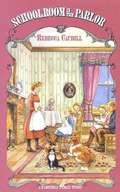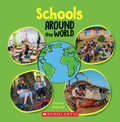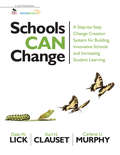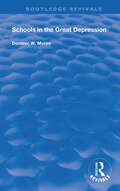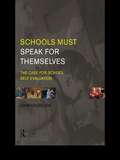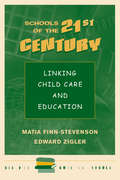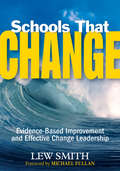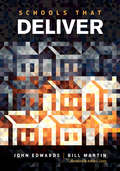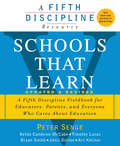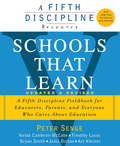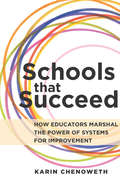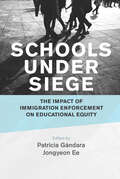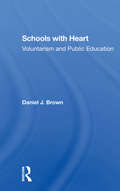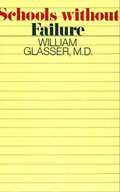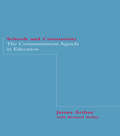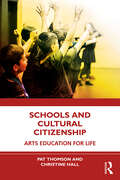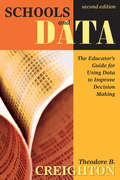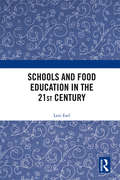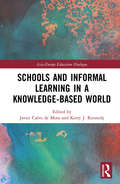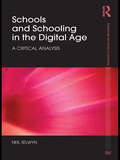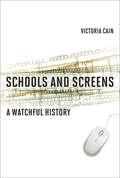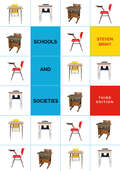- Table View
- List View
Schoolon Mein Kachra Prabandhan (Waste Management in Schools): स्कूलों में कचरा प्रबंधन
by Anil Agarwalस्कूलों में कचरा प्रबंधन एक व्यावहारिक मार्गदर्शिका है जिसे सेंटर फॉर साइंस एंड एनवायरनमेंट (CSE) द्वारा ग्रीन स्कूल्स प्रोग्राम (GSP) के तहत विकसित किया गया है। यह पुस्तक स्कूलों और छात्रों को ठोस कचरा प्रबंधन की प्रक्रियाओं को समझने और लागू करने में मदद करती है। इसमें कचरे के स्रोत, प्रकार, ऑडिट प्रक्रिया, पुनर्चक्रण, और खाद बनाने जैसे विषय शामिल हैं। प्राथमिक और माध्यमिक स्तर पर लागू होने वाली यह सामग्री शिक्षकों और छात्रों के लिए गतिविधियाँ, अभ्यास और पाठ योजनाएँ प्रदान करती है। मैनुअल का उद्देश्य छात्रों को पर्यावरण के प्रति जागरूक, जिम्मेदार नागरिक बनाना और स्कूलों को शून्य-कचरा संस्थान बनने की दिशा में प्रेरित करना है।
Schoolroom in the Parlor (Fairchild Family Series, #4)
by Rebecca CaudillFrom the Database: School in the Kentucky hills goes from August to the last Friday before Christmas. After that the snows are too high, and later, the thawing rivers too full, for the Fairchild children, and their neighbors, the Wattersons, the Sawyers, and the Huffs to make it safely to the little school house in the woods. Now that Althy is fourteen, Mr. Fairchild has other plans for the long winter months. Learn, along with Bonnie, Debbie, Chris and Emmy, what it is like to have school at home in the early 1900's. The fourth and final book in the "Fairchild Family" series.
Schools Around the World (Around the World)
by Brenna MaloneyDiscover countries, cultures, and traditions in this new series!Every day, all around the world, kids go to school, eat lunch and play games... And yet, these universal experiences, can look very different between different countries. These books will take our readers on a trip around the globe to celebrate diverse cultures and traditions, and will show us how different (and how similar) we all are!
Schools Around the World (Into Reading, Read Aloud #Module 1, Book 4)
by Clare LewisNIMAC-sourced textbook
Schools Can Change: A Step-by-Step Change Creation System for Building Innovative Schools and Increasing Student Learning
by Dale W. Lick Karl H. Clauset Carlene U. MurphyBuild a dynamic system for change! From NCLB to Common Core standards, we are inundated with directives for improving our schools. How can we really create lasting change? By applying the Change Creation system! Learning community pioneers Dale Lick, Karl Clauset, and Carlene Murphy lead teachers, principals, and schools in this dynamic approach to school improvement. With a free, comprehensive online collection of practical resources, this book shows you how to: Develop the right vision, relationships, and culture to create and sustain change Model learning-inquiry cycles for action teams for success Build loyalty, trust, and responsibility within your teams and across the school
Schools In Great Depression
by Dominic W MoreoFirst Published in 1996. The Great Depression was not a seamless web of human experience. Disparate images of highs and lows in daily individual experiences proliferated. This study is a modest attempt to delineate the effects of the Great Depression upon the schools. For the most part, the “voices” of this work are drawn from the press and periodicals of the times. On one level, this work is concerned with the coming of the Depression and its effects upon the schools. It is a tale worth telling.
Schools Must Speak for Themselves: The Case for School Self-Evaluation
by John MacBeathThis best-selling book illustrates how schools can tell their own story. It draws on ground-breaking work with the National Union of Teachers to demonstrate a practical approach to identifying what makes a good school and the part that pupils, parents and teachers can play in school improvement. Its usefulness for and use by, classroom teachers to evaluate their practice will prove to be its greatest strength in an ever expanding effectiveness literature.
Schools Of The 21st Century: Linking Child Care And Education (Renewing American Schools Ser.)
by Matia Finn-StevensonAn engaging discussion about the new roles schools are taking and how they are expanding their traditional mission.. n this timely book, Matia Finn-Stevenson and Edward Zigler argue that the federal government alone cannot address the need for child care and family support services that, like education, should be addressed locally. The authors use their Schools of the 21st Century (21C) program as an example of how schools can provide child care, outreach services, home visitations, and health and nutrition servicesin addition to reading, writing, and arithmetic. Whereas Part Two of the book discusses the authors Schools of the 21st Century program in considerable detail, Parts One and Three address a broader range of issues concerning the effects that early education has on later school success and the various policy and conceptual approaches that have been tried, both nationally and internationally, in an effort to reform schools. The authors also critically review the research on the effects of child care on childrens development and the importance of family support services. Included is a wealth of information on the research and practical applications of school reform initiatives in general and the implementation of child and family support services in particular. }In this timely book, Matia Finn-Stevenson and Edward Zigler argue that the federal government alone cannot address the need for child care and family support services that, like education, should be addressed locally. The authors use their Schools of the 21st Century (21C) program as an example of how schools can provide child care, outreach services, home visitations, and health and nutrition servicesin addition to reading, writing, and arithmetic.Conceptualized in 1987 in response to the child care crisis in this country, 21C has been implemented in over 600 schools in seventeen states. However, schools involvement with increasingly younger children is not without controversy. The authors also address questions regarding evaluation and effective implementation and scale-up strategies, and consider what changes in teacher training programs should occur to prepare teachers for working in schools of the twenty-first century; what provisions should be made to accommodate for the need to staff schools with personnel trained in early child development; and what changes need to be made in the financial structures of schools to accommodate child care and support services.Whereas Part Two of the book discusses the authors Schools of the 21st Century program in considerable detail, Parts One and Three address a broader range of issues concerning the effects that early education has on later school success and the various policy and conceptual approaches that have been tried, both nationally and internationally. Finn-Stevenson and Zigler also critically review the research on the effects of child care on children and other school reform initiatives that have been implemented in schools. Schools of the 21st Century is an engaging discussion about the new roles schools are taking and how they are expanding their traditional mission.
Schools That Change: Evidence-Based Improvement and Effective Change Leadership
by Lew SmithLearn from schools that have made meaningful, positive, and lasting changes! The author presents an in-depth look at eight schools, winners of the National School Change Awards, that have transformed from low-performing into exemplary national status. Smith uses qualitative research, specific examples, and portraiture to offer an inside view of the day-to-day dynamics of school change. This insightful book examines questions such as: Why are some schools able to change while other schools cannot? Why are people challenged by change? What is the best way to measure change? What professional characteristics must principals develop to bring about significant and sustainable change?
Schools That Deliver: Australia/uk Version
by John Edwards William C. MartinDeliver real change and real results for your school This book focuses directly on what promotes delivery. It provides the practical tools and implementation guide for re-invigorating your school. Set against a solid blend of international research and international best practice, the narrative is carried by voices from schools that are currently delivering across six countries. They tell it how it is, in lived reality. Every process in the book has been tested and refined under the heat of practice, addressing the current realities in education. The book provides a carefully selected repertoire of skills, models, and processes that: deliver results for children, teachers, school leaders, families and their communities build trust through ensuring every voice is heard and respected develop a strong culture of leadership and alignment, while recognizing and embracing the complexities of school change address the frustrations currently felt by teachers in a positive, productive way Schools That Deliver fills the gap between intention and delivery. The book respects your voice, and your ability to create your own ways of delivering while remaining loyal to the unique personality of your school. When a school community delivers together what really matters for their children, they feel the true joy of education, that splendid feeling of professional satisfaction and achievement that we all deserve.
Schools That Deliver: Australia/uk Version
by John Edwards William C. MartinDeliver real change and real results for your school This book focuses directly on what promotes delivery. It provides the practical tools and implementation guide for re-invigorating your school. Set against a solid blend of international research and international best practice, the narrative is carried by voices from schools that are currently delivering across six countries. They tell it how it is, in lived reality. Every process in the book has been tested and refined under the heat of practice, addressing the current realities in education. The book provides a carefully selected repertoire of skills, models, and processes that: deliver results for children, teachers, school leaders, families and their communities build trust through ensuring every voice is heard and respected develop a strong culture of leadership and alignment, while recognizing and embracing the complexities of school change address the frustrations currently felt by teachers in a positive, productive way Schools That Deliver fills the gap between intention and delivery. The book respects your voice, and your ability to create your own ways of delivering while remaining loyal to the unique personality of your school. When a school community delivers together what really matters for their children, they feel the true joy of education, that splendid feeling of professional satisfaction and achievement that we all deserve.
Schools That Learn (Updated and Revised): A Fifth Discipline Fieldbook for Educators, Parents, and Everyone Who Cares About Education
by Bryan Smith Art Kleiner Peter Senge Nelda Cambron-Mccabe Timothy Lucas Janis DuttonA new edition of the groundbreaking book that brings organizational learning and systems thinking into classrooms and schools, showing how to keep our nation’s educational system competitive in today’s world. Revised and updated - with more than 100 pages of new material – for the first time since its initial publication in 2000 comes a new edition of the seminal work acclaimed as one of the best books ever written about education and schools. A unique collaboration between the celebrated management thinker and Fifth Discipline author Peter Senge and a team of renowned educators and organizational change leaders, Schools that Learn describes how schools can adapt, grow, and change in the face of the demands and challenges of our society, and provides tools, techniques and references for bringing those aspirations to life. The new revised and updated edition offers practical advice for overcoming the many challenges that face our communities and educational systems today. It shows teachers, administrators, students, parents and community members how to successfully use principles of organizational learning, including systems thinking and shared vision, to address the challenges that face our nation's schools. In a fast-changing world where school populations are increasingly diverse, children live in ever-more-complex social and media environments, standardized tests are applied as overly simplistic "quick fixes," and advances in science and technology continue to accelerate, the pressures on our educational system are inescapable. Schools That Learn offers a much-needed way to open dialogue about these problems – and provides pragmatic opportunities to transform school systems into learning organizations. Drawing on observations and advice from more than 70 writers and experts on schools and education, this book features: -Methods for implementing organizational learning and explanations of why they work -Compelling stories and anecdotes from the “field” - classrooms, schools, and communities -Charts, tables and diagrams to illustrate systems thinking and other practices -Guiding principles for how to apply innovative practices in all types of school systems -Individual exercises useful for both teachers and students -Team exercises to foster communication within the classroom, school, or community group -New essays on topics like educating for sustainability, systems thinking in the classroom, and “the great game of high school.” -New recommendations for related books, articles, videotapes and web sites -And more Schools That Learn is the essential guide for anyone who cares about the future of education and keeping our nation’s schools competitive in our fast-changing world.
Schools That Learn: A Fifth Discipline Fieldbook for Educators, Parents, and Everyone Who Cares About Education
by Bryan Smith Art Kleiner Peter M. Senge Timothy Lucas Janis Dutton Nelda H. Cambron-McCabeA new edition - revised and updated with over 100 pages of new material - of the groundbreaking book that brings the principles of organizational learning to today s schools and classrooms.
Schools That Succeed: How Educators Marshal the Power of Systems for Improvement
by Karin ChenowethInformed by years of research and on-the-ground reporting, Schools That Succeed is Karin Chenoweth&’s most inspiring and compelling book yet—an essential read for educators who seek to break the stubborn connection between academic achievement and socioeconomic status. Chenoweth draws on her decade-long journey into neighborhood schools where low-income students and students of color are learning at unexpectedly high levels to reveal a key ingredient to their success: in one way or another, their leaders have confronted the traditional ways that schools are organized and have adopted new systems, all focused on improvement. In vivid profiles of once-embattled schools, Chenoweth shows how school leaders doggedly and patiently reorganized internal systems in order to prioritize teaching and learning, resulting in improved outcomes that in many cases exceeded statewide averages. From how they use time to how they use money, schools that succeed combine a deep belief in the capacity of their students to achieve with deliberate systems focused on student needs. As a result, they create vibrant places &“where teachers want to teach and students want to learn."
Schools Under Siege: The Impact of Immigration Enforcement on Educational Equity
by Patricia Gándara and Jongyeon EeUsing original qualitative and quantitative data, Schools Under Siege confronts the many ways, direct and indirect, in which US Immigration and Customs Enforcement (ICE) policies and practices disrupt education. The book explores not only the impact of these policies on the six-million-plus K–12 students in the US at risk for being directly affected by enforcement but also the wide-ranging consequences for their classmates, educators, and communities.Fear, stress, and trauma invoked by the threat of ICE detention and deportation contribute to increased absenteeism, decreased student achievement, and parent disengagement. Bullying becomes more widespread, and a multitude of other effects impact school climate and student health and well-being. Amplifying the burden, these effects are experienced disproportionately in poorly funded districts and Title I schools and are felt more acutely among vulnerable populations such as immigrant students, English language learners, and Latinx students.Schools Under Siege highlights the work of teachers, counselors, and administrators who are addressing these day-to-day challenges in support of students and families. It provides a profile of a model sanctuary school and offers practical advice for how educators, local governments, and nonprofit agencies can work together to mitigate the collateral damage of immigration enforcement. The book suggests how concerned persons can advocate for immigration policy reform at the local, state, and federal levels.Ultimately, editors Patricia Gándara and Jongyeon Ee chart a course into a future that makes good on the promise of equitable education for all students.
Schools With Heart: Voluntarism And Public Education
by Daniel BrownIn Schools with Heart , Brown explores voluntarism by using original data gathered from 185 interviews with public school principals, teachers, and volunteers, many of whom worked in schools known for their volunteer programs. Supplementing these data from other studies, this careful inquiry finds that volunteers offer much to schools. School volun
Schools Without Fail
by William GlasserThe author of the bestselling Reality Therapy offers daring recommendations to "shake up educators" (Alexander Bassin).
Schools and Community: The Communitarian Agenda in Education
by Richard Bailey Dr James ArthurCommunitarianism, as a movement, is clearly a dominant theme within New Labour's educational policy. How does this affect education and the life and work of schools?Research has shown that there is a correlation between academic achievement and the strength of community life and awareness within a school. The aim of this book, therefore, is to introduce communitarian thought to classroom teachers and to those working in education. The book contextualizes the current debates within education around the many topical ideas being developed by communitarian thinkers, including:character building; the role of parents; the community and the individual; values education and citizenship; community education; and standards and ethos in schools.Throughout, the book makes specific reference to the practical implications for both primary and secondary schools as well as for further education colleges.This is a timely book that should be of interest to all those working in schools and with children and young people. It aims to be a guide to this important and highly influential movement that is shaping our educational future.
Schools and Cultural Citizenship: Arts Education for Life
by Christine Hall Pat Thomson‘Why study the arts at school?’ This book offers a fresh perspective on this question. Informed by rigorous research, the book argues that the arts help young people to develop key skills, knowledge and practices that support them to become both critical appreciative audiences and socially engaged cultural producers. Drawing on a three-year study in partnership with the Royal Shakespeare Company and Tate, Cultural Citizenship sets out an ecological model for cultural citizenship that goes beyond the classroom, including families, the media and popular culture. The authors introduce new, interrelated concepts to change how we consider arts education. Chapters provide fresh insights, guidance and practical recommendations for educators, including: An introduction to the Tracking Arts Learning and Engagement research Detailed case studies featuring arts rich schools and arts-broker teachers Immersive professional development for teachers and the benefits of partnerships with arts organisations An ecological model for cultural citizenship Focusing on the ways in which cultural citizenship can be taught and learnt, this is an essential read for arts educators, education staff in arts organisations, researchers, postgraduate students, arts education activists and policy makers.
Schools and Data: The Educator's Guide for Using Data to Improve Decision Making
by Dr Theodore B. CreightonImprove instructional leadership practice with proven, easy-to-understand strategies for data-based decision making! This reader-friendly second edition of Schools and Data provides real-world examples and step-by-step procedures for collecting and organizing data, providing every school leader with the means to facilitate more appropriate and effective decision making. With a highly practical method for statistical analysis, this highly accessible resource places special emphasis on: Connecting statistics and educators’ daily work Integrating Excel and SPSS technology Strengthening educators’ data interpretation skills Increasing the focus on correlation and regression Building strong skills in problem analysis, program evaluation, data-driven decision making, and report preparation
Schools and Food Education in the 21st Century: Are We All Foodies Now?
by Lexi EarlSchools and Food Education in the 21st Century examines how schools enact food policy, and through doing so, craft diverse foodscapes that create very different food experiences in schools. The school food policy discourse is made up of an amalgamation of discourses on obesity prevention, nutrition education, welfarism and foodieness. Whilst schools endeavor to enact policy in a variety of ways, this book shows how foodieness is taken up, and can only be taken up differently, in different schools. The book’s unique contribution is to identify the discourse of foodieness and to show how this discourse, whilst seemingly universal, is actually situated in middle-class ideas and is therefore more easily taken up by certain schools. The book argues that the classed nature of foodieness leads to certain food knowledges becoming marginalized or lost and this then positions some schools in tension with their local communities, resulting in widely variant food experiences for children. Earl demonstrates how foodieness is taken up in schools by first exploring how the foodscape at school is shaped by policy and media sources. The book then examines how foodieness is taken up by schools with different SES profiles by showing how food moves through the school day. Asking critical questions on class and poverty that are often overlooked, this book will be of interest to researchers, academics and students working on food issues related to teaching, food, policy and schools in the fields of education, sociology and food studies. It should also be of interest to policymakers, parents and teachers.
Schools and Informal Learning in a Knowledge-Based World (Asia-Europe Education Dialogue)
by Kerry J. Kennedy Javier Calvo De MoraThis book has two purposes: To open up the debate on the role of informal education in schooling systems and to suggest the kind of school organizational environment that can best facilitate the recognition of informal learning. Successive chapters explore what is often seen as a duality between informal and formal learning. This duality is particularly so because education systems expend so much time and effort in certifying formal knowledge often expressed in school subjects reflecting academic disciplines.Recognizing the contribution informal learning can make to young people’s understanding and development does not negate the importance of valued social knowledge: That complements it. Students come to school with knowledge learnt from their families, peers, the community and both traditional and social media. They should not have to "unlearn" this in order to enter the world of formal learning. Rather, students’ different learning "worlds" should be integrated so that each informs the other. In a knowledge-based society, all learning needs to be valued. Some contributors to this book reflect on how new educational systems could be created in a move away from top-down authoritarian and bureaucratic management. Such open systems are seen to be more welcoming in acknowledging the importance of informal learning. Others provide practical examples of how informal learning is currently recognized. Some attention is also paid to the evaluation of informal learning. A key objective of the work presented here is to stimulate debate about the role of informal learning in knowledge-based societies and to stimulate thinking about the kind of reforms needed to create more open and more democratic school learning environments.
Schools and Schooling in the Digital Age: A Critical Analysis (Foundations and Futures of Education)
by Neil SelwynThis book presents a wide-ranging and critical exploration of a topic that lies at the heart of contemporary education. The use of digital technology is now a key feature of schools and schooling around the world. Yet despite its prominence, technology use continues to be an area of education that rarely receives sustained critical attention and thought, especially from those people who are most involved and affected by it. Technology tends to be something that many teachers, learners, parents, policy-makers and even academics approach as a routine rather than reflective matter. Tackling the wider picture, addressing the social, cultural, economic, political and commercial aspects of schools and schooling in the digital age, this book offers to make sense of what happens, and what does not happen, when the digital and the educational come together in the guise of schools technology. In particular, the book examines contemporary schooling in terms of social justice, equality and participatory democracy. Seeking to re-politicise an increasingly depoliticised area of educational debate and analysis, setting out to challenge the many contradictions that characterise the field of education technology today, the author concludes by suggesting what forms schools and schooling in the digital age could, and should, take. This is the perfect volume for anyone interested in the application and use of technology in education, as well as the education policy and politics that surround it; many will also find its innovative proposals for technology use an inspiration for their own teaching and learning.
Schools and Screens: A Watchful History
by Victoria CainWhy screens in schools—from film screenings to instructional television to personal computers—did not bring about the educational revolution promised by reformers.Long before Chromebook giveaways and remote learning, screen media technologies were enthusiastically promoted by American education reformers. Again and again, as schools deployed film screenings, television programs, and computer games, screen-based learning was touted as a cure for all educational ills. But the transformation promised by advocates for screens in schools never happened. In this book, Victoria Cain chronicles important episodes in the history of educational technology, as reformers, technocrats, public television producers, and computer scientists tried to harness the power of screen-based media to shape successive generations of students. Cain describes how, beginning in the 1930s, champions of educational technology saw screens in schools as essential tools for training citizens, and presented films to that end. (Among the films screened for educational purposes was the notoriously racist Birth of a Nation.) In the 1950s and 1960s, both technocrats and leftist educators turned to screens to prepare young Americans for Cold War citizenship, and from the 1970s through the 1990s, as commercial television and personal computers arrived in classrooms, screens in schools represented an increasingly privatized vision of schooling and civic engagement. Cain argues that the story of screens in schools is not simply about efforts to develop the right technological tools; rather, it reflects ongoing tensions over citizenship, racial politics, private funding, and distrust of teachers. Ultimately, she shows that the technologies that reformers had envisioned as improving education and training students in civic participation in fact deepened educational inequities.
Schools and Societies: Third Edition
by Steven BrintSchools and Societies provides a synthesis of key issues in the sociology of education, focusing on American schools while offering a global, comparative context. Acknowledged as a standard text in its first two editions, this fully revised and updated third edition offers a broader sweep, stronger theoretical foundation, and a new concluding chapter on the possibilities of schooling. Instructors, students, and policymakers interested in education and society will find all quantitative data up to date and twenty percent more material covering advances in research since the last edition. This book is distinguished from others in the field by its breadth of coverage, compelling institutional history, and lively prose style. It opens with a chapter on schooling as a social institution. Subsequent chapters compare schooling in industrialized and developing countries, and discuss the major purposes of schooling: transmitting culture, socializing young people, and sorting youth for class locations and occupations. The penultimate chapter looks at school reform efforts, drawing for the first time on comparative studies. A new coda ends the book by considering the educational ideals schools should strive for and how they might be attained. This third edition of Schools and Societies delivers the accessible explanations instructors rely on with updated, expanded information that's even more relevant for students.

